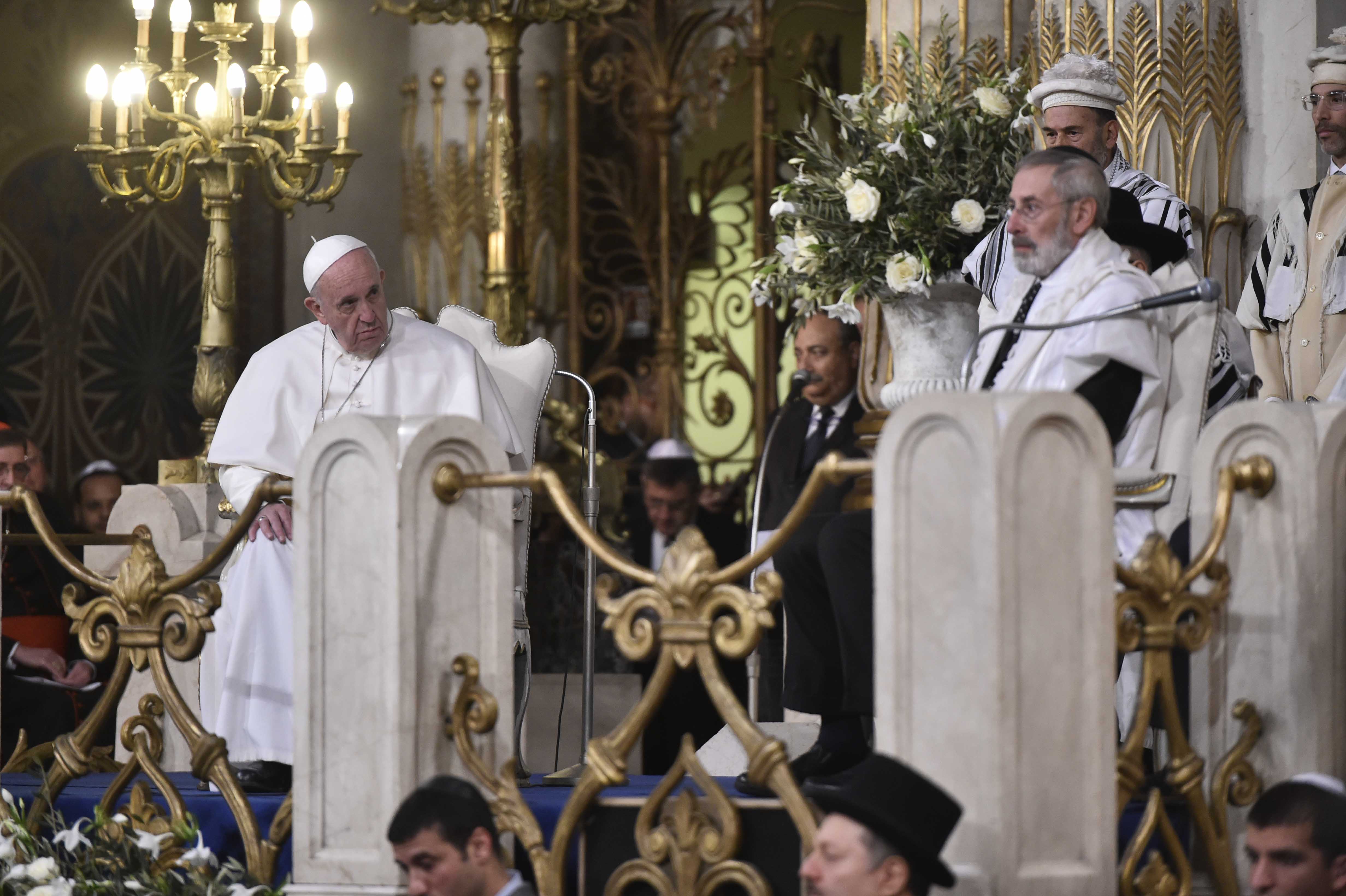Catholics and Jews
Papa Francis at Great Synagogue of Rome: Jews and Christians should “see each other as brothers and sisters united by the same God.” Pope Francis was the third pope to visit Rome’s synagogue, and Chief Rabbi Riccardo Di Segni highlighted that “according to juridical rabbinic traditions, an act repeated three times becomes chazaqa, a fixed tradition.”

A fraternal embrace on the steps leading into the Synagogue, then, having taken the floor, one simple word: “Welcome”, pronounced with a typical Roman accent, accompanied by a warm smile. For those who know him, the Chief Rabbi of Rome Riccardo Di Segni is usually not very prone to smiles. But the guest is Pope Francis, with whom there is a long-established relationship.
Pope Francis’ visit to the Synagogue of Rome, Sunday January 17. Perhaps it was already recorded in history with the visits of his predecessors John Paul II and Benedict XVI. In 2016, a new chapter is written in the relations between the Jews of Rome and Pope Bergoglio, which opened under the banner of simplicity and friendship. “Today the Temple is grateful to receive the third visit of the Pope and Bishop of Rome”, said Rabbi Di Segni.
With a smile, he added:
“According to Rabbinical law, an act repeated three times becomes chazaqa, a fixed tradition.”
Francis seemed comfortable and at ease. Signalling his long-dated friendship and closeness to the Jewish people, resulting from his years in Buenos Aires. Each one of his gestures, every single word he pronounced, was far from incidental. Those words carry a historical bearing and a prompt reverberation on the Jewish Community. Before entering the synagogue,
The Pope laid a wreath at a plaque in memory of Stefano Gai Tachè, a 2-year-old boy killed in an attack on the synagogue by Palestinian terrorists in 1982.
That tragedy was a “sign” which shows that Rome has already been a target of Islamic terrorism”, pointed out the President of Rome’s Jewish Community Ruth Dureghello. Today Rome is the symbol of all the Jewish Communities of Europe, and first of all, of the community of Jerusalem, hit by radicalism with “stabbings and terror.”
In Rome’s synagogue the Pope delivered significant, anticipated words. “Christians and Jews – he said – must see themselves as brothers and sisters united by the same God and by a common spiritual heritage.” The message is addressed to Christians “who, to understand themselves, cannot fail to refer to their Jewish roots.” Renzo Gattegna, President of all of Italy’s 21 Jewish communities, highlighted the importance of the Pope’s words.
Unfortunately, still today, “prejudice and statements based on contempt continue to circulate, offending and hurting us.”
It is necessary to ensure “wider diffusion, to the entire population”, of the “great work that has been accomplished, to strengthen the sentiments of mutual respect, friendship and brotherhood” between Catholics and Jews, to ensure that the dialogue is not limited to “the elites” and to defeat, once and for all, the “false symbols” and “stereotypes” that worm their way through the population at large. Also in this respect Francis’ decision is not a coincidence. In fact, he decided to visit Rome’s synagogue on January 17, the Day established 20 years ago to mark the furthering of Jewish-Catholic dialogue at grassroots level, in parishes and community halls alike.
But the presence of Pope Francis in Rome’s synagogue is also dictated by the urgencies of the present times. Countries in the Near East and European cities have been set ablaze by wars and terrorism.
“God is the God of life.” “The violence of man against man is in contradiction with every religion worthy of this name.
The Pope’s words were echoed by Ruth Dureghello, who added: “Faith does not generate hatred. Faith does not shed blood, faith calls for dialogue.” She went on: “Our hope is that this message will reach the many Muslim people who share with us the responsibility to improve the world in which we live. We can only make it together.”
Seated in the first rows of Rome’s synagogue was the Imam Yahya Pallavicini, vice-president of Coreis-Italy
In his visit to Rome’s Synagogue Pope Francis paid tribute to the victims of the Shoah and to the increasingly few survivors of the unspeakable tragedy of the 20th century. All those present in the temple, visibly moved, welcomed Francis’ words with a standing ovation. With sensitively chosen words, Pope Francis went on: “Today I wish to remember them with all of my heart. Their sufferings, anguish and tears must never be forgotten.”
“The past must be a lesson to us for the present and the future. The Shoah teaches us that maximum vigilance is always needed in order to intervene quickly in defense of human dignity and peace.”
The accomplishment of peace is an uphill road, blemished by prejudice, by stories laden with suffering, bloodshed and persecutions. Jews, Christians, and Muslims can – in fact they must – follow this path together, recognising each other as brothers and sisters, sons and daughters of the One and Only God. The visit to Rome’s synagogue is a historic landmark in this long journey of humanity towards the day when –as Rabbi Di Segni said – “these divisions will disappear” and “great ideas which characterize our identity” will “be used to serve our communities.”